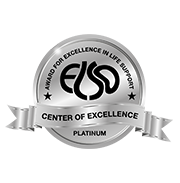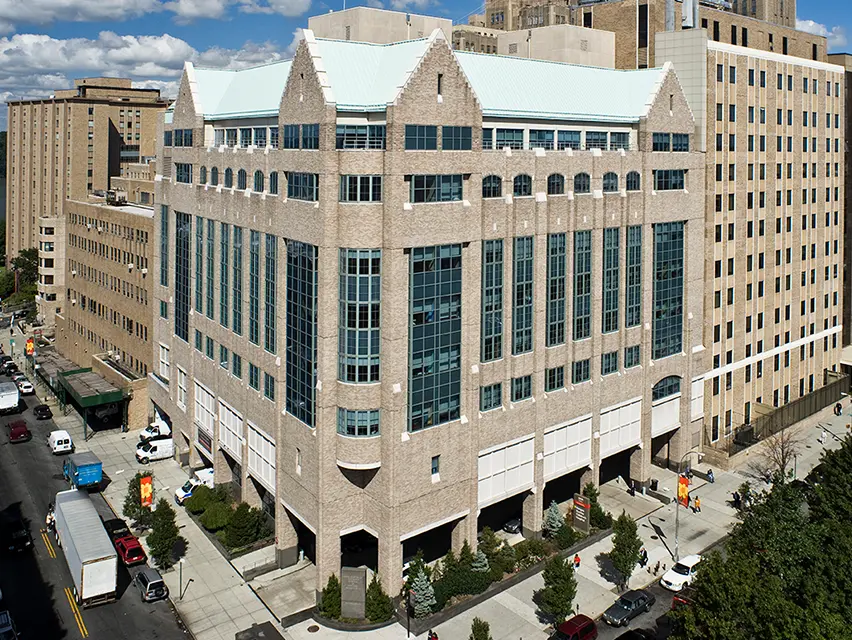Pulmonary hypertension is a serious condition that affects the smallest blood vessels in the lungs and can cause permanent lung damage and life-threatening heart failure. Children with pulmonary hypertension need specialized care, like that found at the Pulmonary Hypertension Comprehensive Care Center at NewYork-Presbyterian Morgan Stanley Children’s Hospital.
Specialized pulmonary hypertension care
Serving patients at NewYork-Presbyterian Morgan Stanley Children’s Hospital
Our multidisciplinary team offers the most advanced diagnostics and targeted medical treatments for patients of all ages —from newborns to adults—with all types of pulmonary hypertension. As part of a world-renowned medical center, your child will receive advanced, personalized care that is designed to meet your child’s needs and improve quality of life.
Our Center is the only one in the tri-state region - and one of only 8 in the country - accredited as a Center of Comprehensive Care for children by the Pulmonary Hypertension Association's Pulmonary Hypertension Care Centers program. We are also accredited as an Adult Pulmonary Hypertension Comprehensive Care program.

About our program
The Pulmonary Hypertension Comprehensive Care Center at NewYork-Presbyterian Morgan Stanley Children's Hospital is one of the largest in the world. Established over 25 years ago, the Center is committed to the treatment of both children and adults with pulmonary hypertension. As part of NewYork-Presbyterian, a world-renowned medical center, we are able to bring together a team with extraordinary expertise in the treatment and management of pulmonary hypertension, including some of the best heart and adult lung transplant surgeons in the world. Your child will have access to the most recent treatments and clinical trials, along with compassionate care from a team whose members have dedicated themselves to helping patients with this life-threatening disease.
What we treat
At the Pulmonary Hypertension Comprehensive Care Center, we treat primary forms of pulmonary hypertension including:
- Idiopathic pulmonary hypertension (no known cause)
- Pulmonary arterial hypertension
- Chronic thromboembolic pulmonary hypertension
- Pulmonary hypertension in newborns
We also treat secondary forms of pulmonary hypertension caused by other underlying conditions such as:
- Chronic lung diseases/Bronchopulmonary Dysplasia: Congenital diaphragmatic hernia, Omphalocele and other developmental lung diseases
- Pulmonary Vein stenosis
- Congenital Diaphragmatic Hernia
- Clotting disorders
- Congenital heart disease
- Genetic (familial) conditions
- HIV disease
- Lupus and other rheumatologic diseases
- Scleroderma
- Sickle cell disease
- Toxins
- Liver disease
- Kidney disease
Treatments
Your child’s treatment plan will depend upon the type and severity of their disease. Once we make an accurate diagnosis, we will develop a comprehensive treatment plan that may address the underlying cause of your child’s pulmonary hypertension as well as the disease itself. Treatments can range from medication alone, to novel surgeries, to lung transplant (adults only).
Treatment is complicated and may change over time, so monitoring and follow-up care is a critical part of every patient's plan. We will involve you every step of the way.
Medications
Treatment for pulmonary hypertension may include one or more medications:
- Diuretics (water pills): Diuretics help eliminate excess fluid from the body's tissues and arteries, reducing swelling and fluid buildup in the lungs and helping your child’s heart do less work.
- Blood vessel dilators (pulmonary vasodilators): Vasodilators open narrowed blood vessels. There are many different types of these medications, which can be given as an oral medication, through an inhaler device, or continuously through an intravenous (IV) catheter connected to a small pump that fits on a belt or subcutaneous infusion pump into the skin. Different types of vasodilators have different side effects.
- Prostanoids: These medications are vasodilators that can be delivered orally, by inhalation or through a subcutaneous or intravenous pump to relax the lung blood vessels.
- Endothelin receptor antagonists (ERA): These medications help prevent blood vessels from narrowing.
- Phosphodiesterase Inhibitors (PDE 5 Inhibitors): These medications open the blood vessels in the lungs to allow better blood flow.
- Soluble guanylate cyclase (SGC) stimulator: This medication interacts with nitric oxide to help relax and lower pressure in the blood vessels of the lungs.
- Oxygen: Oxygen therapy involves breathing pure oxygen to treat low oxygen in the blood. In severe cases of pulmonary hypertension, continuous oxygen therapy may be necessary.
- Calcium channel blockers: These drugs help decrease blood pressure by relaxing the muscles in the walls of the blood vessels. Calcium channel blockers are effective in a small number of people with pulmonary hypertension.
- Digoxin: Digoxin can help strengthen heartbeat and control heart rate.
Interventional Procedures/Surgery
When medication alone is no longer effective, there are interventional procedures and surgical treatments for certain forms of pulmonary hypertension. We are one of a few programs in the country that offers pulmonary thromboendarterectomy (PTE), curative surgery for chronic thromboembolic pulmonary hypertension (CTEPH), and a novel modified Potts shunt for advanced pulmonary arterial hypertension.
- Balloon pulmonary angioplasty: A minimally invasive interventional procedure in which the lung arteries, blocked by a clot, can be opened up by inserting a tiny balloon and inflating it inside the artery. This surgery is performed using X-ray imaging to guide a long thin tube called a catheter, which is inserted through a tiny incision in the neck or leg vessel, to the artery. The balloon opens up the artery, lowering pressure and reducing strain on the right side of the heart.
- Pulmonary thromboendarterectomy (PTE): PTE surgery can reverse pulmonary hypertension in some patients with chronic thromboembolic pulmonary hypertension (CTEPH), a rare form of pulmonary hypertension caused by clotting in the lungs. A surgeon removes all clots from the arteries in the lung enabling the lung pressure to normalize.
- Unidirectional valved shunt (modified Potts shunt): A surgery in which a tube connection is established from the main pulmonary artery to the descending aorta. This diverts blood to the body without having to go through the damaged lungs. It takes off strain from the right ventricle in cases of severe pulmonary hypertension.
- Atrial septostomy: An interventional procedure in which one of our cardiology experts creates an opening between the upper left and right chambers of the heart (atria) to relieve the pressure on the right side of the heart with a catheter.
- Lung or heart-lung transplant: When other treatments fail, some children with pulmonary hypertension are referred out for a lung or heart-lung transplant.
- Extracorporeal Membrane Oxygenation (ECMO): ECMO is a machine that functions as an artificial lung to support a child's own failing lungs. The ECMO circuit pumps the child's blood through a special device that allows for the delivery of oxygen and removal of carbon dioxide. ECMO can be used as a mechanical bridge to recovery or transplantation.
- Pulmonary Vein Stenosis (PVS): PVS is treated with interventional catheterization- angioplasty or stenting. Some patients may need surgical repair. Many patients are also started on medications to slow the progression of disease and decrease chances of narrowing again.
Specialized care for newborns with pulmonary hypertension
At the Pulmonary Hypertension Comprehensive Care Center, infants diagnosed with persistent pulmonary hypertension of the newborn (PPHN) receive the highest level of expertise and all the resources necessary to help him or her through this life-threatening condition along with the expert neonatology teams. Our goal when treating newborns with PPHN is to increase the flow of oxygen to your baby’s organs, maintain normal blood pressure, and prevent serious problems that can occur due to lack of oxygen. Treatments include medicines and respiratory therapy options, such as:
- Oxygen: Your baby may receive supplemental oxygen through a mask or plastic hood.
- Assisted ventilation: A ventilator takes over your baby's breathing through a tube which is inserted into your baby's windpipe.
- Nitric oxide: This gas relaxes blood vessels and improves blood flow to the lungs. It is given through the ventilator.
- High frequency oscillatory ventilation: This type of ventilation is used when other types of ventilation aren't effective.
- Other medications used to treat the Pulmonary hypertension and help maintain Blood Pressures.
- ECMO
Our approach to care
Individualized treatment
Pulmonary hypertension is complex, and each case is unique. While there is no cure for pulmonary hypertension, major treatment advances over the past decade have improved quality of life for children with the disease. We take an individualized approach to diagnosis and treatment, developing a plan for each child based on his or her particular needs. This may include genetic testing, medications, specialized surgeries, and clinical trials. No other center in the country offers as broad a range of options, expertise, and specialized care for this disease.
Ongoing education and support
We are committed to educating and supporting our patients and their families as they navigate the challenges posed by this disease. Our team includes nurses who are there to provide information, support, and care for you and your family.
Why choose us
Multidisciplinary expertise
In our Pulmonary Hypertension Comprehensive Care Center, a multidisciplinary team of experts including pediatric cardiologists work hand in hand with neonatal and pediatric cardiac intensivists and cardiac surgeons to ensure the best outcomes for children. Your child can receive all of the care he or she needs in one hospital. The Columbia team helped establish the Pediatric Pulmonary Hypertension Network (PPHNet), a national organization to advance research and care for children with pulmonary hypertension.
National accreditation
NewYork-Presbyterian Morgan Stanley Children’s Hospital is home to the only Pediatric Pulmonary Hypertension Center that is accredited by the Pulmonary Hypertension Association in the tri-state region, and one of only 8 in the country. Through this accreditation, we have established our commitment to providing excellence in pulmonary hypertension care.
Pioneers of novel surgery for end-stage pulmonary hypertension
Our pediatric pulmonary hypertension team developed the reversed valved Potts shunt, a novel surgery that alleviates strain on the right side of the heart. Children from all over the country to come to our institution for this novel surgery as a palliative bridge.
Experts in the genetics of pulmonary hypertension
Columbia researchers have long been leaders in the field of genetic discovery in pulmonary arterial hypertension and reported the very first mutation associated with inherited forms of pulmonary hypertension. We collaborate closely with our medical genetics experts to provide genetic counseling and testing for patients and families with inherited forms of pulmonary hypertension.
Advancing the field through research
Columbia physician-investigators remain at the forefront of research to advance the field. In fact, both Columbia have participated in most of the clinical trials to date evaluating new medical treatments, including the first drug approved for pulmonary hypertension—intravenous epoprostenol—in 1995. Our clinician-investigators continue to pursue studies of newer therapies. Columbia and Weill Cornell Medicine are among two of the seven centers participating in an adult NIH study to precision medicine in pulmonary vascular disease and right heart failure. Your child may have the opportunity to participate in a clinical trial assessing a promising new treatments.
Innovative Services and Award-Winning Programs
The Pulmonary Embolism Response Team (PERT) Consortium
A common cause of pulmonary hypertension is clots (emboli) in the pulmonary arteries. NewYork-Presbyterian is proud to be part of the Pulmonary Embolism Response Team (PERT) Consortium, a national initiative to advance the care of patients with pulmonary embolism by performing research, developing advanced treatment protocols, and educating clinicians and community members. We are following acute pulmonary embolism protocols including clot lysis, acute surgical embolectomy where appropriate with extracorporeal membrane oxygenation (ECMO) support as needed, and a team to provide close follow-up.
Chronic Thromboembolic Pulmonary Hypertension (CTEPH) and Pulmonary Thromboendarterectomy Programs
NewYork-Presbyterian/ Columbia University Irving Medical Center offers amultidisciplinary program for chronic thromboembolic pulmonary hypertension (CTEPH), the end result of persistent obstruction of the pulmonary arteries by acute or recurrent pulmonary clots (emboli). The CTEPH program offers patients:
- Surgical approaches: An innovative procedure known as pulmonary thromboendarterectomy (PTE) clears the pulmonary arteries to address chronic CTEPH. We one of the few U.S. centers and one of the largest in the country performing PTE, which has been shown to be the best treatment to extend a patient’s survival. We have performed over 250 pulmonary thromboendarterectomy surgeries, with excellent outcomes.
- Lung transplantation and supportive therapy with Extracorporeal Membrane Oxygenation (ECMO), a tool to take care of patients with right heart failure and pulmonary hypertension.
- Interventional approaches: We are one of the few U.S. centers performing balloon pulmonary angioplasty (BPA) for CTEPH. BPA is a lesser invasive alternative for patients who either too high risk for pulmonary artery thromboendarterectomy or have had a recurrence of symptoms after surgery. We have performed over 40 procedures at NewYork-Presbyterian since the start of the program in 2016.
National Award-Winning ECMO Program
NewYork Presbyterian’s pulmonary hypertension programs provide the best care and the best outcomes to patients who suffer from both heart failure and pulmonary hypertension. The Extracorporeal Membrane Oxygenation (ECMO) Program at NewYork-Presbyterian/Columbia University Irving Medical Center is one of the largest, most experienced, and most innovative ECMO programs in the world. And it is one of only five ECMO centers in the world designated a Platinum Level Award for Excellence in Life Support from the Extracorporeal Life Support Organization (ELSO). The prestigious Platinum Level award is the highest distinction given by ELSO, and only achieved by a select number of institutions worldwide. Platinum Level recognizes programs that display exceptional care in the delivery of ECMO support in patients with severe cardiac or pulmonary failure.
Bronchopulmonary Dysplasia/Chronic Lung Disease Program
A team of neonatologists, pediatric pulmonologists and pediatric cardiologists (Pulmonary Hypertension), together consult and evaluate all the neonates diagnosed with bronchopulmonary dysplasia and support the primary neonatology and intensive care teams in managing growing preterm infants with BPD/Omphalocele/CDH- all conditions that affect the lungs and may result in pulmonary hypertension. These babies are seen by the same team as outpatients after discharge at the Pulmonary Hypertension Center.
Congenital Diaphragmatic Hernia Program
This is a program run by a team of pediatric cardiology, pediatric surgery, gastroenterology, pulmonology, genetics and advance practice providers. All infants who are diagnosed with CDH are seen at this clinic which runs on the second Tuesday each month. Mothers with infants diagnosed with CDH get a prenatal consult with the pulmonary hypertension specialist, the surgeon and neonatology team. Once the baby is born, they are evaluated by the team of neonatologists, surgeons and PH experts before and after surgical repair and management decisions are made by a team approach. The CDH program has one of the best outcomes of surgical repair in the country, because of this comprehensive team approach.
 NewYork-Presbyterian/Columbia University Irving Medical Center has been repeatedly designated a Platinum Level Award of Excellence in Life Support by the Extracorporeal Life Support Organization (ELSO), since the first year the Platinum designation was awarded.
NewYork-Presbyterian/Columbia University Irving Medical Center has been repeatedly designated a Platinum Level Award of Excellence in Life Support by the Extracorporeal Life Support Organization (ELSO), since the first year the Platinum designation was awarded.



